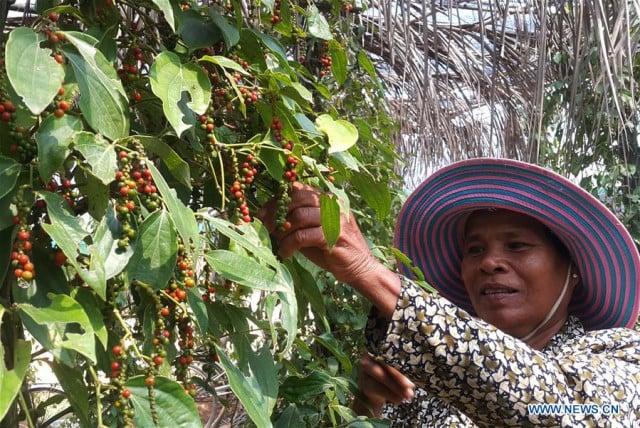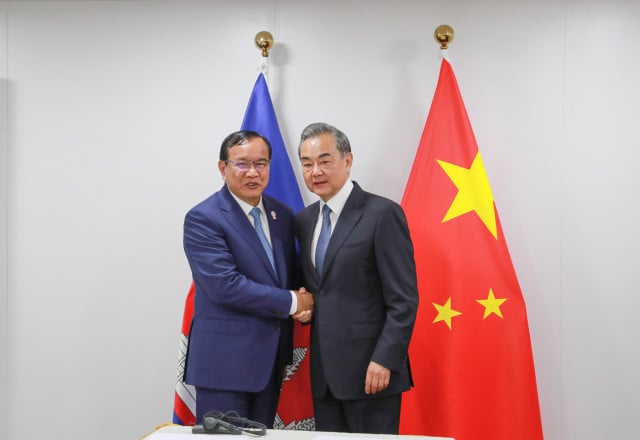Innovation in Agriculture Critical to Food Security

- By Sao Phal Niseiy
- February 24, 2022 7:07 PM
Changing climate and growing population pose challenges
PHNOM PENH--Promoting innovation in agriculture will benefit Cambodia’s sustainable production and ensure food security, experts say.
Agriculture accounts for over 20 percent of the country’s gross domestic product. The Ministry of Agriculture, Forestry and Fisheries says 1.9 million households take part in agricultural production to feed the country’s 16 million people.
However, increasingly frequent extreme weather due to climate change has greatly affected the agricultural sector, prompting concern for future food security as the country tries to cope with the mounting demand for food from the growing population.
Speaking at the agricultural market fair and innovation fair with the theme of “Innovation for sustainable agri-food systems and climate-resilient agriculture” on Feb. 16, Ho Puthea, deputy director of the General Directorate of Agriculture said one agri-food worker in 2012 had to feed 2.8 people, but one agri-food worker will have to feed up to 4.5 people by 2030.
Coping with this challenge required significant labor-saving innovation in agri-food systems. Innovative approaches would help boost income for small-scale farmers and increase production capacity and resilience in food production.
“Agricultural production innovations are about introducing new processes and new ways of doing things, aiming to increase the quality and quantity of agriculture production for more profit generation and competitiveness while safeguarding the environment and the health of the population,” Puthea said.
Sou Socheath, executive director of NGO Live & Learn Cambodia, focused on environmental sustainability, agreed that Cambodia needs to boost agricultural innovation as it will benefit food security greatly.
“Innovation can boost crop production with less expenses in the long run, saving energy and labor,” Socheath said. It could help farmers solve climate crises in agriculture or farming instantly.
The country could now focus on important aspects of which farmers can take advantage. These are technological innovations that are pro-poor, or which reduce poverty, and skill and technical innovation.
“Pro-poor technological innovation refers to all new technology development that could help leverage farm or cropping activities while increasing yields at low cost and addressing climate change,” Socheath said.
Skill and technical innovation involved practical knowledge or know-how to achieve sustainable and resilient farming as well as crop production.
Challenges ahead in integrating innovation
The Food and Agriculture Organization in Cambodia says the government is beginning to pay attention to promoting innovation in agriculture but many roadblocks remain.
Challenges include limitations in partnerships in agriculture innovation between stakeholders, deficient national capacity to facilitate innovation, and the lack of a supportive policy framework and an enabling environment.
Antonio Schiavone, FAO head of operation, said Cambodia needs more collaboration and support to build up agricultural innovation.
“To help the majority of the rural population, whose livelihood is strongly relying on farming and natural resources, we need to work closely together to improve agricultural innovation and build capacities of actors at all levels, including development partners, local authorities, and policymakers in order to efficiently facilitate innovation processes and build a strong agricultural innovation system in Cambodia,” Schiavone said.
For Socheath, addressing the challenges requires the government to take the lead and formulate a clear strategy centering more on boosting financial capacity regardless of political interests or motivations.
“At the same time, it must establish its own strategy, especially on building up financial capacity, to deal with the challenges while not waiting for financial support from development partners or bilateral loans,” Socheath said.
“A public-private partnership platform must be established to pave the ways for better communication and relationship between stakeholders or actors in the value chains.”
Asked if fostering innovation should be the only way to help deal with potential food insecurity, Socheat said the country should also look into the issue of food waste.
“Food waste is not only an issue that links to food security or macroeconomics but also microeconomic and livelihood issues,” he said.
It necessitated a proper and better education strategy to help raise public awareness of food waste.















